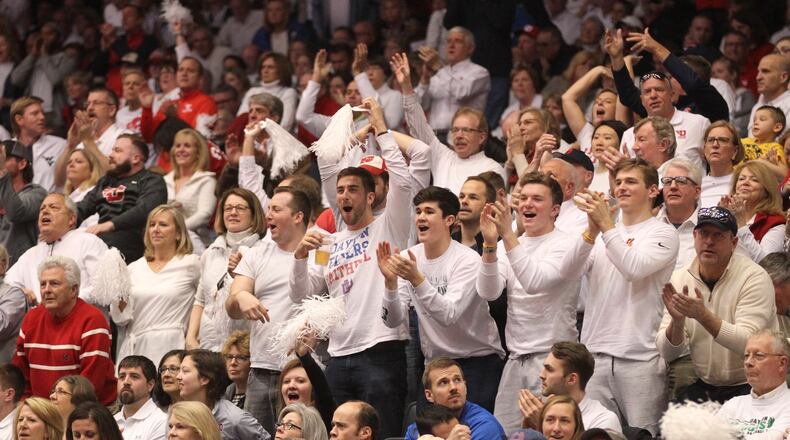Scheduling has always factored into Dayton basketball’s success, and it has been a difficult task for years.
A headline in the Dayton Daily News in November 2007 still holds true today: “Few big schools willing to visit UD: Top teams shy away from traveling to play a mid-major with a raucous home crowd.” That story talked about Dayton and North Carolina discussing a “First in Flight” series and then UNC coach Matt Doherty saying there was no chance his program would play at UD Arena.
If Sullivan were to call current Tar Heels coach Roy Williams, he would get the same answer today. In fact, there’s a good chance he has. He has been turned down, he said, by dozens of programs.
“I’ve called head coaches personally on their cell phone,” Sullivan said.
At this point, Sullivan knows what to expect when they answer.
“It is the most difficult scheduling environment I’ve been involved with since I’ve been here, since 2006,” Sullivan said. “We have just been soundly rejected by what I would say are other NCAA at-large contending teams: from the Power 5, from the Big East.”
Why do so few teams want to play at UD Arena? This quote from an opposing coach or AD sums it up:
“Your place is a deathtrap,” Sullivan was told.
» RECRUITING: 2021 guard receives UD offer
Despite the difficulties, Sullivan likes how the 2019-20 schedule is shaping up. Dayton announced Monday it will play the Saint Mary's Gaels, who should be a top-25 team, on Dec. 8 in the Air Force Reserve Jerry Colangelo Classic at Talking Stick Resort Arena, the home of the NBA's Phoenix Suns.
That means Dayton will have at least five games on a neutral court. It will play three in the Maui Invitational, where possible opponents include BYU, Georgia, Kansas, Michigan State, UCLA, Virginia Tech and host Chaminade. Dayton also will play Colorado on Dec. 21 in the Chicago Legends event at the United Center.
“Overall, our schedule’s healthy,” Sullivan said, “but I’m disappointed for our players and fans that those (Saint Mary’s and Colorado) games aren’t at home.”
Dayton's other known non-conference games are at home against Indiana State on Nov. 9 — that will be the season opener — and at home against Nebraska-Omaha on Nov. 19.
Dayton released its non-conference schedule July 30 last year. Sullivan and Darren Hertz, the assistant coach who assists in scheduling efforts, have work ahead of them to complete this schedule.
“At this time last year, we had maybe a game to go,” Sullivan said. “We’re sitting here in late June, and I’m still holding three or four dates, trying to hold out for these games to happen, which are home-and-home series against at-large caliber opponents. It’s very challenging. We ran some numbers, and if you look at last year’s NCAA tournament, there were 29 at-large Power 5 or Big East teams, and we were the only one in the Atlantic 10 to have hosted one on our home court in Mississippi State, so we were above average at one.”
Dayton and other similar programs are starting to see the impact of the power conferences moving to 20-game conference schedules. That lessens the number of non-conference games they need.
Most Big Ten and ACC programs, Sullivan said, have between 24 and 27 games already set before they have to worry about filling the rest of the schedule. Michigan State, for example, will play 20 Big Ten games, four in the Maui Invitational (one on the mainland), one in the Big Ten/ACC Challenge, one in the Gavitt Tipoff Games and one in the Champions Classic. It also leaves a spot for Oakland on the schedule most years.
» SCHEDULING NEWS: Summit League team coming to UD Arena
If Michigan State plays 31 regular-season games, that leaves three open spots on its schedule.
“The average Big Ten team maybe has 24-27 games already done before they even have to take a phone call from Dayton,” Sullivan said. “Then when they do, they just flat say no. Dayton just doesn’t fit what they’re trying to do.”
The Atlantic 10 and Mountain West Conference will combat their growing scheduling difficulties by starting a challenge series of their own in the 2020-21 and 2021-22 seasons. That series was announced in December, and it will ease Sullivan's scheduling problems by one game.
Still the ripple effect of the power conferences distancing themselves from the rest of college basketball, dominating the NCAA tournament field in the process, will continue to hurt Dayton and others. Sullivan said every scenario is on the table when it comes to scheduling, including playing true road games against programs who won’t return the favor by playing at UD Arena. While that would cost Dayton a home game, Sullivan said he would not let money be a factor in scheduling.
“Obviously, we need a certain amount of home games to fund our athletic program,” Sullivan said, “but when it comes to at-large opportunities and competing in that space, we would do what’s in our best interest, and that means a lot of things.”
About the Author

